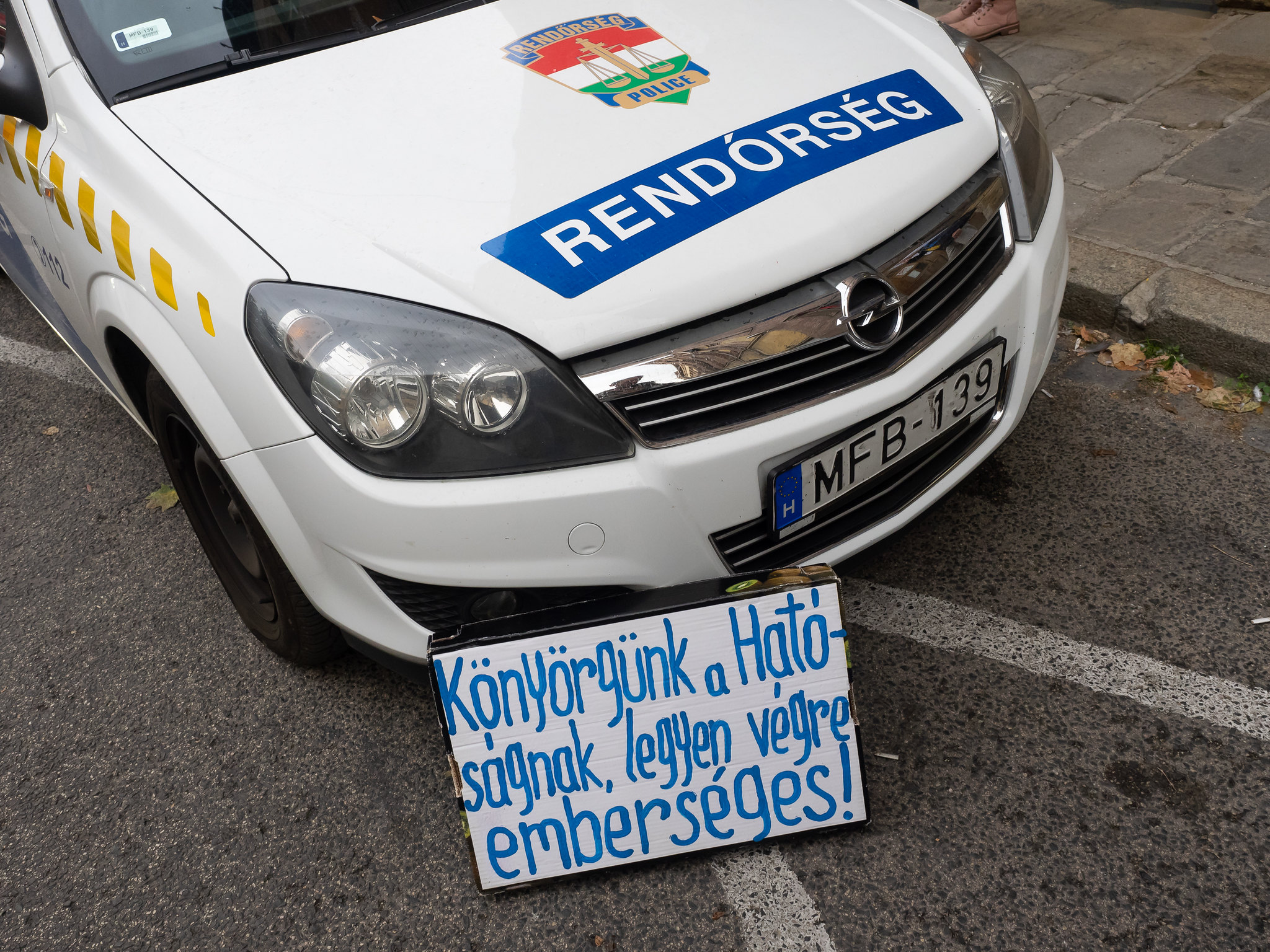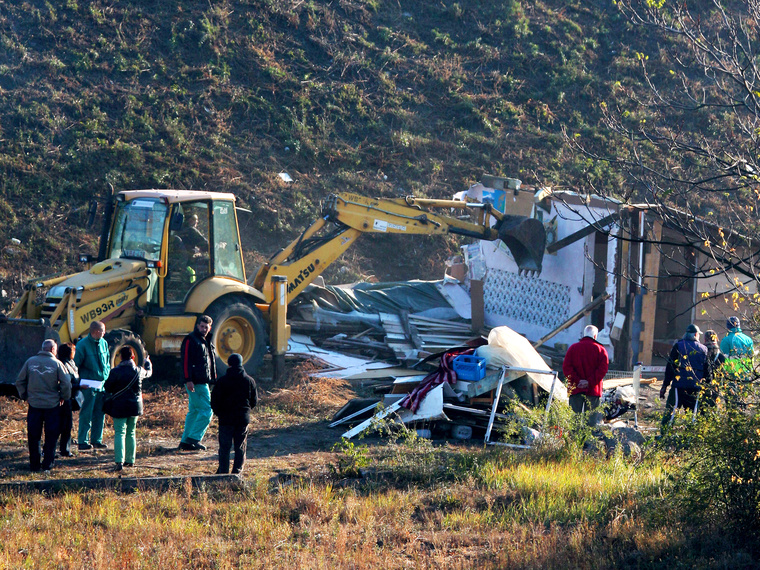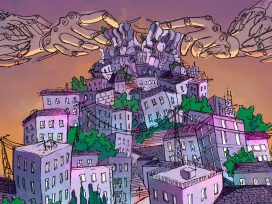Penalizing and criminalizing homelessness is nothing new in many European countries. The 2018 seventh amendment of the Fundamental Law of Hungary nonetheless caused local and international uproar. The international press rarely covers Hungarian issues as extensively as this, and journalists are concerned that an EU member state is violating human rights by treating homelessness as a criminal issue and not a social one. Not only does this ignore European recommendations and the Pillar of Social Rights (accepted in 2017), but even the Universal Declaration of Human Rights.
I am a social worker, housing activist, and founder of the From Streets to Homes Association. I want to see these criminalizing tendencies change. Since the opposition gained leadership in many Budapest districts after the October 2019 elections, people expect their representatives to take action on the housing crisis. Opinions vary as to whether this will include taking steps against criminalization measures. This does not make a big difference, though, since the policy is legislated on a national and even constitutional level, so local election results can have an effect on how it is implemented without abolishing the bills themselves. It is, then, important to mark not only this minor shift, but the first anniversary of the much-debated legal changes, looking at Hungary’s criminalization of homelessness in an international context.

‘We are begging the authorities to finally be humane!’ Protest sign against the first trial of a homeless person under the new criminal code. 19 October 2018. Photo by Anna Vörös, courtesy of A Város Mindenkié (The City is for All) activist group.
Comparison
Roughly a quarter of the world’s population lives in informal housing, but, in the developed world, less than half of one per cent of the population is homeless. This is mostly thanks to welfare, housing, and social policy; trends to hide homelessness from public spaces have, nevertheless, increased in most western countries, and are by no means an exclusively European phenomenon.
Hungarian homelessness statistics are painfully inaccurate. More than fifty thousand people use the homelessness care system annually, and there are up to ten thousand rough sleepers in the country. Not knowing the proper statistics is, in fact, part of the problem; experts estimate that homeless population is above thirty thousand.
UN Special Rapporteur on Housing Leilani Farha called the growing homelessness crisis in America a human rights violation. At the same time, President Trump talks about taking police action against the homeless of San Francisco, and even claims homelessness is an environmental risk.
In EU recommendations, the 19th principle of the European Pillar of Social Rights specifies that access to social housing, or housing assistance of good quality, is to be provided for those in need; that vulnerable people have the right to appropriate assistance and protection against forced eviction; and that adequate shelter and services must be provided to the homeless in order to promote their social inclusion.
However, 67% of Europeans think that adequate housing in their area is too expensive. The number of people affected by street homelessness has also increased in the past decade across Europe, together with the tendencies to criminalize it.
Instead of focusing on social policies for alleviating homelessness, certain policy efforts try to hide the issue instead. FEANTSA (the European Federation of National Organisations working with homeless persons) has been researching European criminalization trends since 2012. They have produced a report on legislative acts in EU countries to this end, with the involvement of local lawyers and human rights advocates.
In most cases, criminalization does not explicitly ban or punish homelessness itself. This makes the Hungarian bill unique: the very offence it penalizes is ‘habitually staying in a public space’, while similar legislation in most countries instead focuses on and bans behaviours that can be related to homelessness.
A variety of other methods are used to ‘airbrush’ city centres and make homelessness invisible. ‘Anti-poor’ architecture and street furniture, such as metal spikes hidden in corners or doorways that could otherwise be used as shelters by rough sleepers, have been showing up across Europe. Street benches are shortened to make it impossible to sleep on them. Public spaces, such as parks, are often closed at night. Anti-homeless legislation, on the other hand, applies equally to everyone. It therefore appears to be not only less discriminatory, but less targeted in its cruelty.
There are many ways to criminalize homelessness. Legislators will often identify and punish behaviour patterns linked to homelessness. This allows them to claim that their law does not penalize homelessness or homeless people as such, only ‘anti-social’ behaviour, such as storing belongings in public space, public urination, rough sleeping, squatting, begging, and drinking or eating on the street are codified as petty crime.
These regulations drive homeless people away from city centres, with two significant implications. First, if someone spends most of their time in a public space where certain acts are prohibited, they are clearly restricted in doing these things at all. This is especially problematic in the case of food and drink. Second, law enforcement often discriminates against homeless offenders in petty crime cases.
Rough sleeping is the act most easily linked to homelessness. It should come as no surprise that bans on it have the longest history of all criminalizing tendencies. For example, Public Space Protection Orders in Britain bans both rough sleeping and begging. This did not, however, raise the same debates as Hungarian legislation for two reasons.
First, PSPOs ban the act, and not the social situation of the offender. Second, it is supported by the reasonably successful ‘no second night out’ policy, which aims to shelter rough sleepers. In addition, the ban on rough sleeping in the precedent-based English common law has the longest history in Europe. The Vagrancy Act (1824) legally penalizes rough sleeping, and yet there was still a public outcry when councils began fining people for spending the night outside. The Home Office claims, however, that the regulation is not specifically targeted at homelessness.
Similarly, in Austria sleeping in any public space or vehicle is regulated. Sleeping in bags, tents, and vehicles (apart from on campsites), as well as staying in public parks outside of opening hours, are all prohibited. Rough sleeping can result in a seven hundred euro fine.
The most commonly criminalized act linked to homelessness, meanwhile, is begging. It is banned in various EU member states, including Scandinavian countries. Norway had dropped the plans to ban street begging, but they have been debating proposed suggestions on the matter together with Sweden, where the ban had passed and authorities began to enforce it in early 2019. Belgium has introduced regulations on begging, enforced by local municipalities, in controversial local ordinances. The central government had decriminalized begging, yet Liége introduced its local ban in 1999, followed by Charleroi and the whole Brussels area. Begging bans had been in force in Denmark, Greece, Germany, most of Austria, and Hungary well before the new legislation brought attention to the issue. Begging with children is mostly prohibited across the EU – but these regulations do not criminalize homelessness and are usually grounded in child protection legislation.
Austria penalizes anti-social behaviour in a way that is especially clear-cut for homelessness-related behaviour. Begging in public places, for example, is prohibited by eight out of nine counties, excluding Burgenland.
Restrictive regulations on squatting and self-built shacks are becoming more strict in a number of European countries in parallel with the steep rise of house prices and rent levels. It is a cruel paradox: the harder it is to find adequate affordable housing, the harsher the regulation becomes.
This overview is not a full analysis of criminalization, rather highlighting the phenomenon of European trends to share patterns of penalizing acts related to homelessness. The following section presents to the events in Hungary leading up to and following the introduction of the ‘homelessness ban’.

Police arresting activists who try to avert the eviction of a family with five children from a 29 m2 council flat. One policeman steps on the logo of the Orbán government’s campaign ‘Year of the Families’. Photo is courtesy of Dóra Papp.
Criminalization in Hungary
Even though both the domestic and international press discussed the bill as if it were a novelty, the criminalization of homelessness in Hungary is far from new. Begging bans were introduced shortly after the transition, and there were acts openly criminalizing homelessness more than seven years before the constitutional amendment came into force in 2018, making being homeless an offence on its own. The Misdemeanour Working Group, consisting of civil rights advocates, had been dealing with these issues since 2015.
Tünde Komoróczki, volunteer lawyer of Street Lawyers Association and member of the Working Group, explains how the new law states that ‘living on the street habitually’ is a petty offence. This is openly discriminatory as it does not penalize rough sleeping (by, say, a middle-class person after a night of partying), but the offender’s social situation. The regulation says that if an offender is caught three times in ninety days, the police initiates a criminal procedure. The ‘offender’ is then incarcerated, and court proceedings must be implemented within seventy-two hours. The court may establish innocence, issue a warning, or issue a sentence of community service or confinement. However, if the same offender is found guilty a second time within six months, the only option is incarceration. Street Lawyers hold that this phrasing still leaves room for acquittal but, in practice, this never happens. Every case is ruled in an expedited procedure.
The amendment provides no new rules against self-built shacks. Even so, before the rule came in, the police gave out informal warnings and patrolled areas where there were homeless huts, especially in Budapest and other bigger cities. After the amendment, the police began informing people living in huts that they cannot stay in their homes as a result of the new law.
My recent book includes interviews with Budapest’s homeless conducted by my colleagues and volunteers around the time the rough sleeping ban was introduced. We saw people living in self-built shacks with their belongings packed up in just one rucksack, ready to escape at a moment’s notice if the police told them to. In other cases, people did not even wait for notice; they simply fled places they had stayed for years or even decades, and social workers reported that they had lost track of many clients.
This is not the case, though, as demolishing a shack still requires a separate legal procedure. Illegal demolitions of homeless shacks still took place after the law was introduced, including those carried out by local authorities.
Social workers believe that, even if their clients may not end up in jail, the fear of police warnings and the destruction of their homes will deter homeless people from their usual spots. These fears did, indeed, materialize. Irén Kártyás, Leader of Street Care Services at the Menhely Foundation stated that, after one year of the regulation, social workers find it harder to contact clients.
At the same time, shelter providers did not report a notable increase in the number of service users. And, even if this was the case, shelters in Budapest had already been operating above capacity in the winter months.
The law was introduced in October 2018. I wrote a piece around this time expressing my worries about it. What actually happened is probably not as bad as we expected, but the bill is still on the books, mostly as a threat of police action against our clients, which could begin at any moment when made convenient by political or other reasons.
Before the latest constitutional amendment, which made it possible to modify the Act on Misdemeanours, local municipalities were charged with regulating the issue of residing on public premises for habitation from 2013. With this amendment, the issue was elevated to the constitutional level. Most local governments did not introduce a ban, or any regulation applying specifically to homeless people, however. Some municipalities made restricted areas, such as those near schools or kindergartens, or historical heritage sites, where ‘living habitually’ was forbidden. This was problematic enough, but now the offence is legislated on the national level and with accompanying scope.
When the latest bill was introduced, not only social care professionals, but writers, lawyers, judges and doctors publicly objected.
In official communications, the government referred to nineteen thousand ‘service points’ in the homeless shelter system, but never cited the source of the data. Laundry services, daytime spaces, or street kitchens alone will clearly not solve the problem of rough sleeping. At the same time, the Hungarian Central Statistics Office’s data records about eleven thousand beds in shelters.
On the very day the amendment came into force, the police, according to their own statistics, issued 27 warning notices. More than 100 warnings were issued the next day, and a total of 193 in the first ten days. Early on, it was not clear for many clients if any verbal warning, or merely talking to a police officer, had ended up as an ‘official notice’ or not. First level police intervention is called a ‘verbal warning’, so social workers were not sure either. ‘Verbal warning’ as a form of authority notice is not used in other forms of offences, which again points to the discriminatory nature of the legislation. If someone does not know if the warning they received was official or not, the only way to find out is to inquire from the police, which no one will do if it risks getting another warning. Human rights activists are pointing out that the warning process itself is discriminatory. This was clear even before the bill came into force.

Excavators tearing down irregular housing in the 14th district of Budapest on 11 October 2011. The eviction was executed without any warning, as an early step of the capital’s war on the homeless. The people thus deprived of all their belongings and their living space later won in a case against the municipality in 2014, but one of had already died by then. This photo was used as evidence in the trial; courtesy of Dóra Papp.
The first court decision condemned a man from Gödöllő, a town in the Budapest metropolitan area, who did not make an appeal. His case was followed by that of a woman in Budapest, a widowed cancer-patient, and then two men from the capital. For one of them, the trial was made impossible by his health. In these three cases, human rights lawyers of the Street Lawyer association intervened. All three were acquitted.
In these cases, the defendants were not allowed to be present at their own court hearing. They had to stay in detention, connected to the courtroom through video calls. Their lawyers maintain that this procedure was not only discriminatory but unjustified, as this distant hearing procedure was designed for witness protection, not the court proceedings of a defendant.
Within two weeks, cases in other cities followed. A judge in Kaposvár ruled the regulation unconstitutional and sent the issue to the Constitutional Court in late October. This ruling was confirmed by the court of Székesfehérvár, and later by three additional judges in Budapest. In each case, the procedure was suspended. No new litigation was initiated until the decision of the Constitutional Court. According to crime statistics from the Ministry of the Interior, a total of thirteen cases were brought to court in 2018, and additional eleven in 2019. The number of official warnings was significantly higher: hundreds were issued in the first few weeks. Journalists obtained information on them, as they are not included in crime statistics. After the first weeks, the police assessed that verbal warnings have no real consequences and stopped issuing them.
Recently, the Constitutional Court ruled that ‘the right to deprivation and homelessness does not constitute a part of human rights’. However, the misdemeanour can only be penalized by court if the offender’s access to a shelter bed was ensured at the time of committing the offense.
Leilani Farha wrote about the legislation in the UN’s Annual report, stating that it violates international and EU human rights conventions and initiatives. She also produced an amicus curiae on the request of Street Lawyers to point out that the legislation is also violating Hungarian legislation.
Since the Constitutional Court’s decision was only issued recently, it is hard to tell what to expect in the future. Social workers and human rights lawyers had been reporting new cases of police warnings issued since the decision, though in lower numbers than during the law’s first weeks of operation.
In addition, an anonymous police officer claimed that even law enforcement officers do not think the verbal warnings are useful, and do not understand why their time and resources should be used for warning homeless persons when they have no means of offering any solution or substantial help to them. Yet the former Mayor of Budapest, just a month before municipal elections, introduced the idea of closing down underpasses for the night to deter rough sleepers. The idea was, I can now confirm, not welcomed.
It looks like criminalization has not resulted in a decrease in the number of persons affected by street homelessness, and yet the matter continues to be more of a political game rather than a subject of effective social policy.
No Country for the Poor’: the Green Spider documentary followed the work and lives of the City is for All activists’ for two years, including evictions, child separations, and a founding member dying of tuberculosis.










